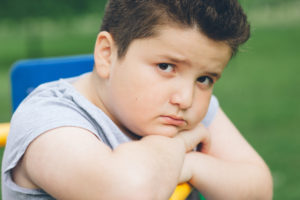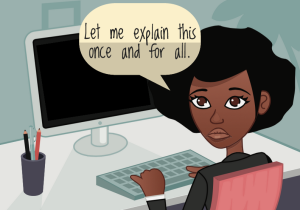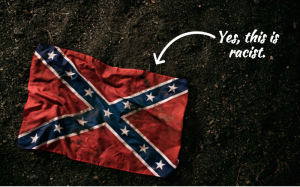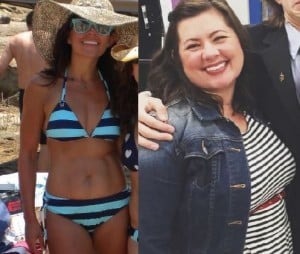Originally published on Bullshit.ist and republished here with the author’s permission.

A sad child leans over play equipment with their arms crossed.
(Content Note: mentions of fat-shaming, ableism, and racism)
At dinner, my neighbor’s five-year-old grandson, Taylor, watched me sit down and said to his grandpa, at full volume, “Haha, she’s even fatter than me! She’s fat.” He finished with emphasis, looking at me out of the corner of his eye, because clearly, those statements were for me as well.
Grandfather, along with two others at the dinner table did that pull-back, that suck-up-all-the-air-and-say-nothing response that we’ve all learned in awkward social moments.
I know this child – not well, but I’ve had meals with him before, seen him in the neighborhood. He’s never called me fat before, but who knows? Maybe he was bored and looking for a bit of entertainment. He seemed to want to amuse himself with adult discomfort, or perhaps just with my shame.
Though he was talking to his grandfather, trying to find an accomplice in the joke, I said, “Hey Taylor, did you just call me fat?” And he turned to me, with a little bit of fear on his face because whoa, this isn’t how it’s supposed to go.
I was also speaking at full volume, for the other diners to hear. “I don’t think there’s anything wrong with being called fat, because it’s not bad to be fat. But you know what? Some people think that’s an insult word, so maybe you shouldn’t go calling someone fat. Better wait until you hear people call themselves fat. Then you know they’re okay with it, and then you can use that word, too. Otherwise, you might hurt someone’s feelings. You’re not hurting my feelings though. Fat is just one of the ways bodies can be. So what?”
His mouth hung open for a moment, staring at me. One of the other diners, relieved, said, “Wow, that was a really good answer.”
I nodded and added, speaking to her (but also so that young Taylor could hear), “Well, some people have learned that being fat is shameful. That’s why everyone goes silent when a kid says something like that. It’s good to show them that there’s no shame needed.”
Grandfather raised his eyebrows, impressed, then turned to Taylor and said, a bit tauntingly, “She got no shame for you!” Taylor’s mouth still hung open. “You want to know what shame is?” he continued. “That’s when you’re caught stealing something at the store and everyone sees you get caught. That’s when you feel shame.”
I’m not sure what Taylor was absorbing at that point. He may have been thinking, Wow, sometimes you pipe up and everything takes a hard right turn!
That’s for sure, kid.
Children learn from reflection and from trial and error just like adults. There’s certainly no fast track though. A little while later, he called his grandfather “old man” in a pointed tone meant to hurt. I gave him the “I see you” eyes after he said it, but I didn’t speak.
Taylor’s five, and I know him to be very smart and mouthy and forever fidgety at a dinner table. My grandson is also five. Though my first reflex might be to feel smug for how much better behaved he is than Taylor and how his parents definitely taught him not to feel or throw body shame, it’s not like he’s perfect.
He could also poke a friend and say of someone else sitting at the same table, “He’s fat (or stupid or has slits for eyes or stinky feet or eats salt for dinner or or or)!” Sure he could. He’s five.
And everyone learns that it’s possible to elevate oneself by putting someone else down in a clever way. And if he learns that others will collude with put-downs and that he can feel a sense of belonging by creating an inside joke about someone else, it’s not just possible. It’s likely.
Furthermore, he could do that at school and never admit to being that kind of person at the dinner table with his parents who don’t approve of body shaming.
When my son was five, I overheard him with some neighborhood friends as they played a game on our patio. They were talking about Teenage Mutant Ninja Turtles. It was the biggest show on TV at the time. They were reminiscing about their favorite episodes, and my son chimed in with his favorite episode, too. Blow by blow.
One thing puzzled me. We didn’t have a TV. I asked him later where he’d seen that show and he shrugged and said he’d never seen it. When I told him what I’d overheard, he looked at me, sweet-faced as ever and said, “Oh, when I heard other kids talking about the show, I memorized what they said so I could tell the story again the next time kids were talking about it. Everyone talks about it. I want to talk about it, too.”
I nodded. That made sense.
The woman seated next to me at the dinner table when Taylor commented on my being fat – one of the people who recoiled in silent horror when he said it – is a kindergarten teacher. She’s also the one who said I gave a really good answer. After Taylor turned his attention elsewhere, she told me that she has seen children in her class say this sort of thing, trying to make another child feel bad. She said she never knew what to say.
Really, I thought. Even though a person has children or works with children, somehow, one may never find an adequate response. And maybe that means we aren’t really looking.
Kids learn that there’s power in befuddling adults. Just like there’s power to be gained in successfully hurting another person’s feelings. It’s a sad kind of power, but it’s power nonetheless. Taylor was definitely puffed up in that small moment when everyone fell uncomfortably silent before I spoke.
I’m also thinking about the wording in Taylor’s specific comment: “She’s even fatter than me.” He’s not a fat child at all, though I’ve seen him put away some dessert – four brownies that very night – so I imagine people have threatened him with becoming fat. “Quit eating those or you’ll get fat.” That’s the sort of thing people tell kids all the time.
Still, this is a sophisticated game Taylor has already learned to play well before his sixth birthday. Not only is he controlling adult behavior, albeit briefly, not only is he bonding with someone over the put-down of another, not only does he know which things to say to shame a grown woman, he knows how to ameliorate his own image in the process.
While most adults put aside direct put-downs in favor of subtler shade, many adults still think that if they put themselves down, too, they’re not really being meanies to include others in the insult. It’s one of the ways that fat people themselves can perpetuate fat hatred at the same time that they seek community.
“C’mon,” that kind of inclusive insult says, “we’re all big and gross. I’ll admit it before you throw it in my face – and pull you in while I’m at it.”
My mother still uses the kind of insult Taylor used, regarding food. She’s not fat either. Recently we were eating oatmeal and after spooning brown sugar into her own steaming bowl, she looked over and compared it to the color of my oatmeal. She said, “Wow, I put more sugar in my cereal than everyone – except you.”
We were the only two people at the table. I took a deep breath and replied simply, “I didn’t put any sugar in mine. It’s dark chocolate.”
She sat upright in surprise, and without missing her volley, replied. “Oh! Well, if you want to have chocolate for breakfast, I suppose that makes sense.” No one could call her a bully. No siree.
That Taylor’s a smart kid. I’ll bet you know some like him.
One of the best things about parenting (and grandparenting) is the constant opportunity to up our own game. And we get to choose which game it is, and what we’re teaching.
Whenever there’s a silence after an insult like Taylor’s, or about any unspoken bias that’s suddenly made visible – like when a kid innocently comments on someone’s race or social class – we can pay attention. Make a mental note.
And then, talk that stuff through with peers so that we invent the answers that teach something positive the next time. We rarely have the perfect comeback when we’re surprised. But why be surprised by things that are said or intimated again and again? I’m certainly not surprised when someone speaks ill of fat. It happens all the time; Taylor’s comment, at least, was clear and direct.
Teachers should plan ahead for touchy topics, too. And if you think that’s not their business – that they should stick to the lesson plan – think again. If we want kids to learn math, they’ll focus better if they don’t feel unwanted (or like they need to plan their next attack).
That’s all I did when I spoke up. I had invented a better answer, and I delivered it with clear, calm eye contact. Everyone at the table felt relief, and hopefully Taylor learned something. At the very least, he heard a new response to the kind of comments he’s learned will put people down and give him a bit of pleasure.
Beginning in childhood, I was handed the same shame every fat person has been handed. And for the first part of my life, I carried it. Then I learned to put it down. And then I learned to talk about it.
You can, too.
If we want kids to grow up and take responsibility for their words and actions, it’s time we adults do it more ourselves.
[do_widget id=’text-101′]
Kimberly Dark is a writer, sociologist, and raconteur working to reveal the hidden architecture of everyday life, one clever story, poem, and essay at a time. She also leads retreats on yoga and body-stories. Read more at www.kimberlydark.com. Follow on Medium and Twitter: @kimberlydark.
Search our 3000+ articles!
Read our articles about:
Our online racial justice training
Used by hundreds of universities, non-profits, and businesses.
Click to learn more




















